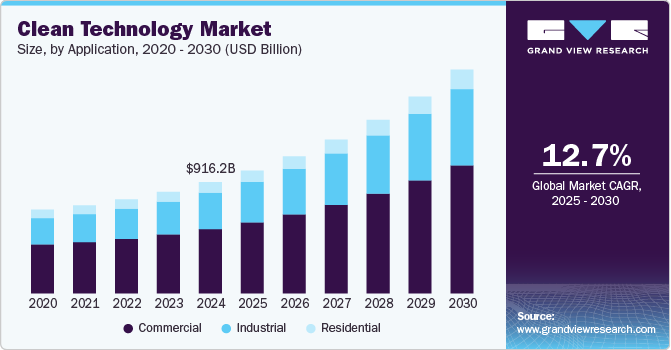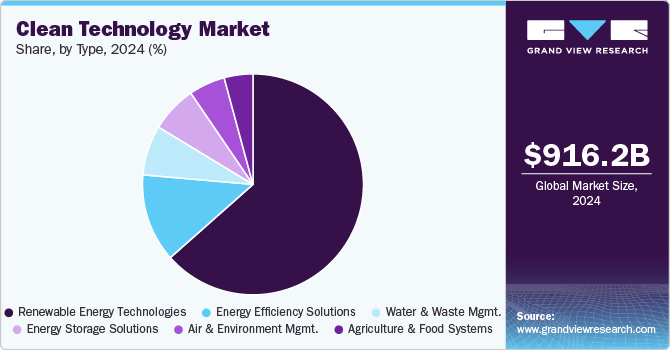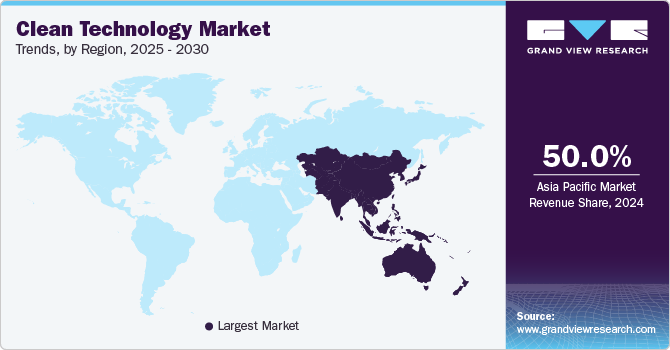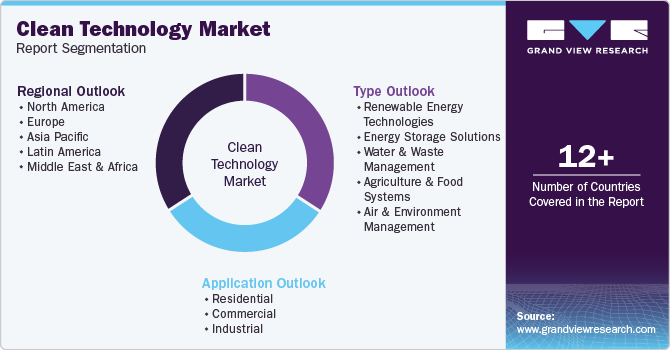- Home
- »
- Next Generation Technologies
- »
-
Clean Technology Market Size, Share, Industry Report, 2030GVR Report cover
![Clean Technology Market Size, Share & Trends Report]()
Clean Technology Market (2025 - 2030) Size, Share & Trends Analysis Report By Type (Renewable Energy Technologies, Energy Storage Solutions, Energy Efficiency Solutions), By Application, By Region, And Segment Forecasts
- Report ID: GVR-4-68040-510-5
- Number of Report Pages: 100
- Format: PDF
- Historical Range: 2017 - 2023
- Forecast Period: 2025 - 2030
- Industry: Technology
- Report Summary
- Table of Contents
- Interactive Charts
- Methodology
- Download FREE Sample
-
Download Sample Report
Clean Technology Market Summary
The global clean technology market size was estimated at USD 916.20 billion in 2024 and is projected to reach USD 1,844.70 billion by 2030, growing at a CAGR of 12.7% from 2025 to 2030. Cleantech encompasses a wide range of innovations, including renewable energy technologies, energy storage, electric vehicles, water treatment, and waste management solutions.
Key Market Trends & Insights
- Asia Pacific dominated the industry with a revenue share of over 50.0% in 2024.
- By type, the renewable energy technologies segment led the market in 2024, accounting for over 62% share of the global revenue.
- By application, the industrial segment dominated the global clean technology market in 2024.
Market Size & Forecast
- 2024 Market Size: USD 916.20 Billion
- 2030 Projected Market Size: USD 1,844.70 Billion
- CAGR (2025-2030): 12.7%
- Asia Pacific: Largest market in 2024
For instance, in October 2024, IBM Corporation acquired Prescinto, asset performance management (APM) software-as-a-service (SaaS) for renewables provider. Prescinto leverages AI to deliver analytics, automation, and advanced monitoring, optimizing operations of renewable energy and efficiently managing storage assets and clean energy.
Declining costs of renewable energy sources, such as solar and wind power, advancements in battery storage, and the proliferation of electric vehicles fuel the market growth. For instance, global solar capacity continues to expand, with technological innovations improving efficiency and affordability. Similarly, the rise of hydrogen as a clean energy vector and carbon capture technologies is transforming the industrial and energy landscapes. Businesses are actively investing in Cleantech not only to comply with regulations but also to capitalize on the growing demand for sustainable products and services. For instance, in March 2024, Ørsted A/S has been selected by the Department of Energy (DOE) Office of Clean Energy Demonstrations to start for federal funding of up to USD 100 million to build Star e-Methanol, a Power-to-X facility along the Texas Gulf Coast.
Supportive government policies, corporate sustainability goals, and increasing consumer awareness about the need for eco-friendly alternatives further accelerate the transition. Clean technologies are no longer niche solutions but have become mainstream, reshaping energy production, transportation, and industrial processes. Key regions such as North America, Europe, and Asia Pacific are leading the way in deploying these technologies, particularly in renewable energy projects and electric mobility. The rise of innovative solutions, such as hydrogen fuel cells, carbon capture, and circular economy practices, is opening new opportunities for growth across various sectors. As clean technologies continue to advance, they are expected to play a crucial role in building a sustainable and resilient global economy, fostering both environmental and economic progress.
Type Insights
The renewable energy technologies segment led the market in 2024, accounting for over 62% share of the global revenue. Renewable energy technologies are advancing due to cost reductions, innovation, and strong policy support. Their diverse strengths collectively contribute to a sustainable global energy transition, with each technology playing a crucial role in achieving carbon neutrality and energy resilience. Declining costs of photovoltaic panels, breakthroughs in technologies such as perovskite cells, and government incentives drive solar adoption. For instance, in December 2024, GE Vernova collaborated with National Renewable Energy Laboratory, to supply a 3.4 MW-140m wind turbine to National Renewable Energy Laboratory, for use in energy research and experimentation. This transaction signifies a strengthened, strategic partnership designed to foster pioneering collaborative research leveraging GE Vernova's assets, highlighting the potential for private sector and government collaboration to advance progress and innovation in the energy research.

The energy storage solutions segment is projected to grow at the fastest CAGR during the forecast period. The growth of the segment is driven by integration with renewable energy sources, advancements in battery technology, policy and regulatory support, and decentralization and resilience needs. Energy storage systems (ESS) smooth this variability, ensuring a steady energy supply. The repurposing of used electric vehicle (EV) batteries for stationary storage reduces waste and cost, driving adoption in grid-scale projects. Governments worldwide are introducing subsidies, tax incentives, and grants to promote energy storage deployment. For instance, the U.S. Inflation Reduction Act includes tax credits for standalone energy storage systems.
Application Insights
The industrial segment dominated the global clean technology market in 2024. The industrial application segment of the clean technology market is driven by a combination of regulatory pressures, cost efficiencies, technological innovations, and societal demands. Industries are adopting clean technologies to reduce emissions, improve efficiency, enhance sustainability, and meet corporate and consumer expectations. As these technologies continue to evolve, industries will find even more opportunities for growth, resource optimization, and alignment with global environmental goals. For instance, in January 2024, Vestas partnered with ArcelorMittal, steel manufacturing company, to introduce a low-emission steel solution designed to substantially reduce the lifetime carbon dioxide emissions associated with wind turbine tower production.
The residential segment is expected to witness the fastest CAGR during the forecast period. The residential application segment in the clean technology market is experiencing significant growth, driven by various factors including environmental awareness, energy cost savings, government incentives, and technological advancements. Homeowners are increasingly conscious of their carbon footprint and are adopting clean technologies to reduce greenhouse gas emissions. International agreements such as the Paris Accord have trickled down to local awareness campaigns, encouraging residential adoption of renewable and energy-efficient technologies.
Regional Insights
Asia Pacific dominated the industry with a revenue share of over 50.0% in 2024. Countries such as China, India, Japan, and South Korea are leading the way in adopting renewable energy technologies, supported by ambitious targets to reduce carbon emissions and transition to sustainable energy systems. For instance, China’s commitment to peak emissions by 2030 and achieve carbon neutrality by 2060 has catalyzed large-scale investments in solar power, wind energy, and green hydrogen projects.

North America Clean Technology Market Trends
The North America clean technology industry is expected to at a significant CAGR during the forecast period, driven by increasing environmental concerns, government incentives, and technological advancements. The region, particularly the U.S. and Canada, has established itself as a leader in the adoption of renewable energy solutions and sustainable technologies. A key driver for the market is the strong governmental support in the form of policies, subsidies, and tax credits aimed at encouraging the transition to clean energy.
U.S. Clean Technology Market Trends
The U.S. clean technology industry dominated the regional industry in 2024. Government policies and incentives play a significant role, with increased support for clean energy solutions such as solar, wind, and electric vehicles. The Inflation Reduction Act and other clean energy policies have provided substantial tax credits, grants, and subsidies, driving investment in clean technologies and making them more affordable for both consumers and businesses.
Europe Clean Technology Market Trends
The Europe clean technology industry held a significant revenue share in 2024. European countries are at the forefront of implementing stringent environmental regulations and policies aimed at reducing carbon emissions and promoting sustainability. Initiatives such as the European Green Deal, which aims for carbon neutrality by 2050, along with the EU Emissions Trading System (ETS), create a favorable environment for the adoption of clean technologies, including renewable energy, electric vehicles, and energy efficiency solutions.
Key Clean Technology Company Insights
Some key companies in the clean technology industry include GE Vernova, IBM Corporation, Vestas, Canadian Solar, Adani Green Energy Limited and others.
-
Adani Green Energy Limited is a prominent renewable energy company. Adani Green Energy Limited is a subsidiary of the Adani Group. Adani Green Energy Limited specializes in developing, owning, and operating utility-scale grid-connected solar, wind, and hybrid renewable power plants across India. The company integrates advanced technologies to enhance operational efficiency, including Radio Frequency Identification (RFID) and GPS technology, and Virtual Reality (VR)-based training modules. The company is actively contributing to India's renewable energy goals, aiming to reduce dependence on imports and enhance domestic production. The company is establishing a comprehensive solar supply chain within India, including manufacturing components such as ingots, wafers, cells, panels, and polysilicon.
-
Canadian Solar specializes in renewable energy and solar technology, manufacturing solar photovoltaic modules, providing battery energy storage solutions and solar energy, and developing utility-scale battery and solar power energy storage projects. Its operations span a diverse geographic footprint, with sales and a development pipeline at various stages across North America, South America, Europe, Africa, the Middle East, Australia, and Asia. The company's activities are organized into two primary business segments: CSI Solar and Recurrent Energy.
Key Clean Technology Companies:
The following are the leading companies in the clean technology market. These companies collectively hold the largest market share and dictate industry trends.
- Adani Group
- Canadian Solar
- Enel Spa
- General Electric
- Iberdrola, S.A.
- IBM Corporation
- Jinko Solar
- NextEra Energy Resources, LLC
- Ørsted A/S
- Vestas
Recent Developments
-
In December 2024, GE Vernova collaborated with National Renewable Energy Laboratory, to supply a 3.4 MW-140m wind turbine to National Renewable Energy Laboratory, for use in energy research and experimentation. This transaction signifies a strengthened, strategic partnership designed to foster pioneering collaborative research leveraging GE Vernova's assets, highlighting the potential for private sector and government collaboration to advance progress and innovation in the energy research.
-
In September 2024, IBM Corporation and United Nations Development Programme launched new interactive models on energy within United Nations Development Programme's global GeoHub platform. These advanced solutions leverage technologies like the data platform and IBM Watsonx AI to empower users ranging from national and community policymakers to the general public-to analyze complex energy challenges using advanced artificial intelligence (AI). By providing access to a broad array of resources, these solutions facilitate data-driven decision-making to support a just energy transition.
-
In August 2024, Ørsted A/S partnered with Mission Clean Energy, a utility-scale renewable energy and storage developer, to advance four standalone battery energy storage systems (BESS) across the Midwest. The partnership with Mission Clean Energy enhances Ørsted A/S's development efforts and expands the range of technologies available to utilities and other customers.
Clean Technology Market Report Scope
Report Attribute
Details
Market size value in 2025
USD 1,013.25 billion
Revenue forecast in 2030
USD 1,844.70 billion
Growth rate
CAGR of 12.7% from 2025 to 2030
Actual data
2017 - 2023
Forecast period
2025 - 2030
Quantitative units
Revenue in USD billion/million and CAGR from 2025 to 2030
Report coverage
Revenue forecast, company ranking, competitive landscape, growth factors, and trends
Segments covered
Type, application, region
Regional scope
North America; Europe; Asia Pacific; Latin America; MEA
Country scope
U.S.; Canada; Mexico; Germany; UK; France; China; India; Japan; Australia; South Korea; Brazil; UAE; South Africa; KSA
Key companies profiled
Adani Group; Canadian Solar; Enel Spa; General Electric; Iberdrola, S.A.; IBM Corporation; Jinko Solar; NextEra Energy Resources, LLC; Ørsted A/S; Vestas
Customization scope
Free report customization (equivalent up to 8 analysts working days) with purchase. Addition or alteration to country, regional & segment scope.
Pricing and purchase options
Avail customized purchase options to meet your exact research needs. Explore purchase options
Global Clean Technology Market Sgementation
This report forecasts revenue growth and provides an analysis of the latest trends in each of the sub-segments from 2017 to 2030. For this report, Grand View Research has segmented the global clean technology market based on type, application, and region:

-
Type Outlook (Revenue, USD Million, 2017 - 2030)
-
Renewable Energy Technologies
-
Energy Storage Solutions
-
Energy Storage Solutions
-
Water and Waste Management
-
Agriculture and Food Systems
-
Air and Environment Management
-
-
Application Outlook (Revenue, USD Million, 2017 - 2030)
-
Residential
-
Commercial
-
Industrial
-
-
Regional Outlook (Revenue, USD Million, 2017 - 2030)
-
North America
-
U.S.
-
Canada
-
Mexico
-
-
Europe
-
UK
-
Germany
-
France
-
-
Asia Pacific
-
China
-
India
-
Japan
-
Australia
-
South Korea
-
-
Latin America
-
Brazil
-
-
Middle East and Africa
-
UAE
-
KSA
-
South Africa
-
-
Frequently Asked Questions About This Report
b. The global clean technology market size was estimated at USD 916.20 billion in 2024 and is expected to reach USD 1,013.25 billion in 2025.
b. The global clean technology market is expected to grow at a compound annual growth rate of 12.7% from 2025 to 2030 to reach USD 1,844.70 billion by 2030.
b. Asia Pacific dominated the clean technology market with a share of 52.6% in 2024. Countries like China, India, Japan, and South Korea are leading the way in adopting renewable energy technologies, supported by ambitious targets to reduce carbon emissions and transition to sustainable energy systems.
b. Some key players operating in the clean technology market include Adani Group, Canadian Solar, Enel Spa, General Electric, Iberdrola, S.A., IBM Corporation, Jinko Solar, NextEra Energy Resources, LLC, Ørsted A/S, Vestas
b. Declining costs of renewable energy sources, such as solar and wind power, advancements in battery storage, and the proliferation of electric vehicles fuel the market growth. For instance, global solar capacity continues to expand, with technological innovations improving efficiency and affordability. Similarly, the rise of hydrogen as a clean energy vector and carbon capture technologies is transforming the industrial and energy landscapes. Businesses are actively investing in Cleantech not only to comply with regulations but also to capitalize on the growing demand for sustainable products and services.
Share this report with your colleague or friend.
Need a Tailored Report?
Customize this report to your needs — add regions, segments, or data points, with 20% free customization.

ISO 9001:2015 & 27001:2022 Certified
We are GDPR and CCPA compliant! Your transaction & personal information is safe and secure. For more details, please read our privacy policy.
Trusted market insights - try a free sample
See how our reports are structured and why industry leaders rely on Grand View Research. Get a free sample or ask us to tailor this report to your needs.










